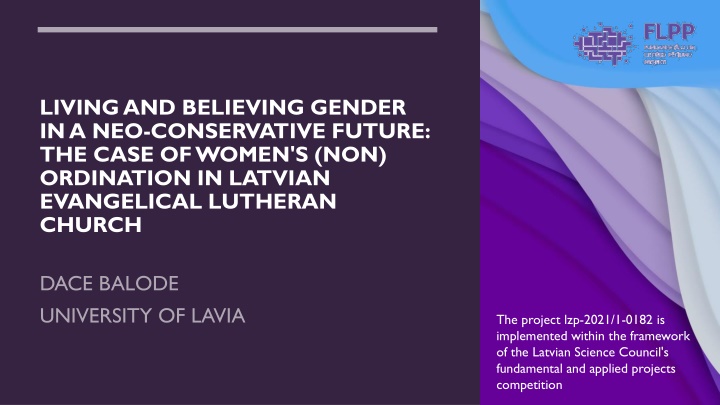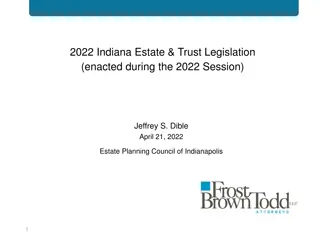
Living and Believing Gender in a Neo-Conservative Future: Women's (Non) Ordination in Latvian Evangelical Lutheran Church
Explore a project in Latvia aiming to strengthen gender equality by examining women's ordination in the Latvian Evangelical Lutheran Church. The project delves into factors influencing gender inequality, media impact, and theological perspectives on gender roles.
Download Presentation

Please find below an Image/Link to download the presentation.
The content on the website is provided AS IS for your information and personal use only. It may not be sold, licensed, or shared on other websites without obtaining consent from the author. If you encounter any issues during the download, it is possible that the publisher has removed the file from their server.
You are allowed to download the files provided on this website for personal or commercial use, subject to the condition that they are used lawfully. All files are the property of their respective owners.
The content on the website is provided AS IS for your information and personal use only. It may not be sold, licensed, or shared on other websites without obtaining consent from the author.
E N D
Presentation Transcript
LIVING AND BELIEVING GENDER IN A NEO-CONSERVATIVE FUTURE: THE CASE OFWOMEN'S (NON) ORDINATION IN LATVIAN EVANGELICAL LUTHERAN CHURCH The project lzp-2021/1-0182 is implemented within the framework of the Latvian Science Council's fundamental and applied projects competition
to strengthen gender equality and contribute to preventing gender discrimination in Latvia GOAL OD THE PROJECT by providing evidence-based interdisciplinary knowledge, becoming a platform for the discussion on causes, mechanisms and effects of gender discrimination
1) - to gain knowledge on experiencing, practicing and discussing gender in LELC congregations, uncovering factors leading to gender-unequal models, the role of post-socialist and global conservative impacts and the church as a mediating actor and a location for gender (in)equality; 2) - to explore media impact and communication strategies in spreading gender-related messages and women s ordination in particular; 3) - to analyze and develop a gender sensitive and locally relevant theological perspective taking gender into account. OBJECTIVES
1) Anthropological approach Anthropological approach would allow to understand and bring the situation of women and gender inequality in religious organisations into a wider social context. (2) Media discourse approach Exploration and development of a gender communication strategy in the LELC to foster public discussion about gender inequality within target groups - religious organizations and communities - and in the wider society. In this approach it is important to understand the media discourse: how the studied issues have been communicated in the media, bearing in mind that it is also a mediated or even marketized and mediatized environment (Moberg, Marcus, 2017). APPROACH
(3) Theological approach Our theological approach follows the line taken by Elisabeth Schu ssler Fiorenza: all God-talk comes from a certain perspective. (Fiorenza, 1994) We want to find out how theological ideas related to gender have been developing (glocalisation process of global religious ideas, fusion of local interpretative contexts). Plurality (of perspectives) is important here, because we are aware of the diversity of perspectives and dangers of essentialising experiences of one group. This research directions would contribute the development of a reflected theological perspective on understanding gender and its crucial role in the local religious and theological contexts. We understand this task as follows:
THANK YOU FOR YOUR ATTENTION! TO BE CONTINUED...





















